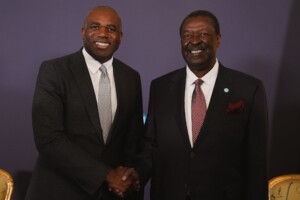UK Special Representative: ‘United front for Sudan stakeholders only recourse for civilian transition’
The British Special Representative for Sudan and South Sudan, Robert Fairweather, shared his hopes for the Sudanese Bar Associations (SBA) steering committee’s transitional constitutional framework and provided some insight into his talks with the Chairman of Sudan’s Sovereignty Council and Leader of Sudan’s Armed Forces, Lt Gen Abdelfattah El Burhan.
 The British Special Representative for Sudan and South Sudan, Robert Fairweather (right) at a public Q&A in London, chaired by the UK branch of the Sudanese Revolutionary Movement on Sunday (Photo: Amgad Abdelgadir / RD)
The British Special Representative for Sudan and South Sudan, Robert Fairweather (right) at a public Q&A in London, chaired by the UK branch of the Sudanese Revolutionary Movement on Sunday (Photo: Amgad Abdelgadir / RD)
The British Special Representative for Sudan and South Sudan, Robert Fairweather, shared his hopes for the Sudanese Bar Associations (SBA) steering committee’s transitional constitutional framework and provided some insight into his talks with the Chairman of Sudan’s Sovereignty Council and Leader of Sudan’s Armed Forces, Lt Gen Abdelfattah El Burhan.
At a public Q&A in London chaired by the UK branch of the Sudanese Revolutionary Movement on Sunday, Fairweather highlighted the importance of the SBA’s efforts in the current political process, stating that the lawyers have “brought together so many different groups”. He added that “seeing people talking is essential” to breaking Sudan’s political standstill, and that “making way for compromises is the only way to see the military move out of power”.
The British diplomat, who is also leader of the Sudan Troika group (Norway. UK, USA) was steadfast in his opinion of including the Sovereignty Council in discussions concerning a potential civilian transition.
‘Making way for compromises is the only way to see the military move out of power…’
He stated that in his talks with El Burhan and the Vice President of the Sovereignty Council and Commander of the Rapid Support Forces (RSF), Lt Gen Mohamed ‘Hemeti’ Dagalo, they “expressed their worries about what would happen to them the next day if they were to relinquish power”.
Fairweather said that he appreciates and sympathises with those who believe the junta should have no part in these discussions, “however, the ultimate goal is to explain why they should give up power and make it so that it is in their interests to do so”.
He stated that whilst the SBA process may “not be perfect” and some stakeholders want no part in these discussions, “differences should be put aside and tabled when you get a democratic government”. He added that it takes “courage and compromise”, and a “unified front” was the only way to ensure a civilian transition. He implored the panel and attendees that “we should take advantage of this current window”.
Transitional justice
Transitional justice is of great importance to the representative. The diplomat recounted his time in Khartoum, meeting the families of those who died during the protests, saying “they did not ask for much, at the very least they wanted an apology and some acknowledgement” from the Sudanese authorities. He assured attendees that justice for the families who lost loved ones was “always at the top of the agenda”.
‘The families of the martyrs know that the chances are the person who pulled the trigger will not face justice, but they want a free Sudan…’
He stated that in his first meeting with El Burhan and his following meetings with the junta’s top brass, he implored them “to stop killing civilians”. However, he stated that transitional justice should be left to Sudan, and the UK could only help facilitate further discussions on this matter.
The special representative added that the need for transitional justice, just as in “countries such as Sri Lanka, Northern Ireland, or South Africa, where a similar need for justice was needed” it must be piloted by Sudan itself.
Fairweather underlined the importance of the economy in the matter of transitional justice, saying that industries ruled by the junta should be nationalised as they have got away with “not paying their taxes”.
In reference to the use of sanctions when questioned by a member of the audience, Fairweather stated that whilst the British government could not talk about the potential use of sanctions against Sudan, he alluded to its potential to be used “if he did not see the progress they expect”.
During a poignant moment in the Q&A portion of the public meeting, Bereir Sorour, the father of slain university student, Ali Bereir, who was shot in the head by a live bullet in the November 17 demonstrations last year, did his best to recount his son’s final moments through a teary-eyed plea for justice to the British representative.
The meeting room fell into a mournful quiet as the father stated he had been “frantically seeking justice” for his son’s death. Whilst on stage, Sorour was clutching the flag his son was carrying before his death; the attendees stood up to applause his strength and chanted various anti-coup slogans such as “our martyrs did not die, they live within the revolution”. The resounding feelings of grief and justice came to be epitomised when Fairweather embraced the bereaved father.
Juba Peace Agreement
On the subject of the 2020 Juba Peace Agreement, Fairweather said it had been slowed due to the October 2021 military coup, as well as “the actions of signatories of the JPA”. He emphasised that the deal is a very “important element”, and “we must not end up with an elite deal that is just good for Khartoum… it should reflect the whole of Sudan”.
The British representative also stated that the junta authorities were not willing to authorise him visiting Darfur, adding that his Norwegian counterpart, Dr Endre Stiansen, was accused by the authorities of “stirring up trouble” during his visit in February.
As previously reported by Radio Dabanga, during his meeting with Fairweather in Khartoum in September, El Burhan stressed the need to achieve national consensus, expand the base of political participation, and return to the transitional path in light of the declared position of the military component to withdraw from the political process.
Reporting by Amgad Abdelgadir for Dabanga Sudan











 and then
and then